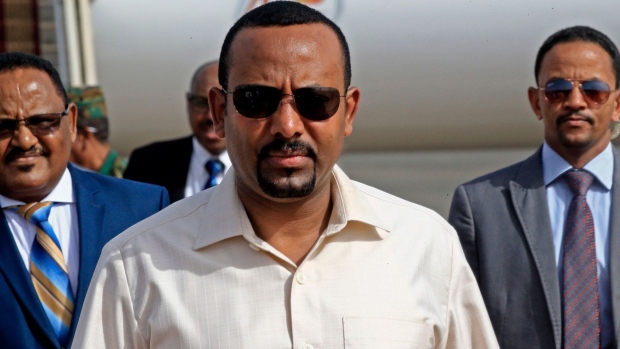Jun 24, 2019
Assassinations Challenge Ethiopian Premier's Reform Agenda: Q&A
, Bloomberg News

(Bloomberg) -- Attacks in Ethiopia at the weekend left the head of the army and the president of the country’s Amhara state among at least five government officials dead.
The killings mark the most serious assaults on Ethiopia’s leadership since the days of the military junta that ruled the country from 1974 until 1987. They come as Prime Minister Abiy Ahmed tries to implement political and economic reforms aimed at attracting more foreign investors to one of the world’s fastest-growing economies.
What happened?
Ethiopian army chief of staff General Seare Mekonnen and retired Major-General Gezae Abera were killed June 22 at Seare’s residence in the capital, Addis Ababa. Their deaths followed the assassinations earlier in the day of Ambachew Mekonnen, the president of the Amhara region, and his adviser, Ezez Wassie. Migbaru Kebede, Amhara’s attorney general, died of his wounds on Monday, according to Abiy’s spokesman, Billene Seyoum.
Who carried out the attacks?
Abiy’s office says the attacks were orchestrated by Brigadier-General Asaminew Tsige, the head of Amhara’s administration and security bureau. Asaminew was previously imprisoned in 2009 for an alleged coup attempt and released last year by Abiy as part of a general amnesty of political prisoners.
No one has claimed responsibility for the attacks. Abiy’s office said Asaminew was shot dead while on the run near Bahir Dar, the capital of Amhara.
What impact have the attacks had?
An unspecified number of people have been arrested and the security forces are searching for others suspected of being involved in the incidents, Abiy said on state television. Ethiopia’s Internet has been switched off, according to according to NetBlocks, an advocacy group that monitors cybersecurity.
“The situation is under control,” Abiy said on state television on Sunday.
Abiy was scheduled to address parliament on Monday morning to discuss the progress he’s made on reforms. The speech has been postponed indefinitely, his office said Monday.
What’s the significance of the timing of the attacks?
Ethiopia has been wracked by opposition protests for the past four years. The unrest has centered on Amhara and Oromia, whose people make up almost two-thirds of the population, over their perceived political marginalization. Prior to Abiy’s appointment, key state organs under Ethiopia’s ruling party had been dominated by minority ethnic Tigrayans.
Former Prime Minister Hailemariam Desalegn, a member of a minority community from the south of the country, stepped down in February after failing to quell the protests. Abiy, an ethnic Oromo, took over the premiership two months later.
Abiy has promised to hold the democratic elections next year as he tries to meet demands from the various groups for greater reform. At the same time, he’s facing opposition by remnants of the old regime within the ruling party to the pace of reforms.
Do the attacks pose any threat to Abiy’s reforms?
--With assistance from Nizar Manek.
To contact the reporter on this story: Samuel Gebre in Abidjan at sgebre@bloomberg.net
To contact the editors responsible for this story: David Malingha at dmalingha@bloomberg.net, Paul Richardson, Karl Maier
©2019 Bloomberg L.P.






